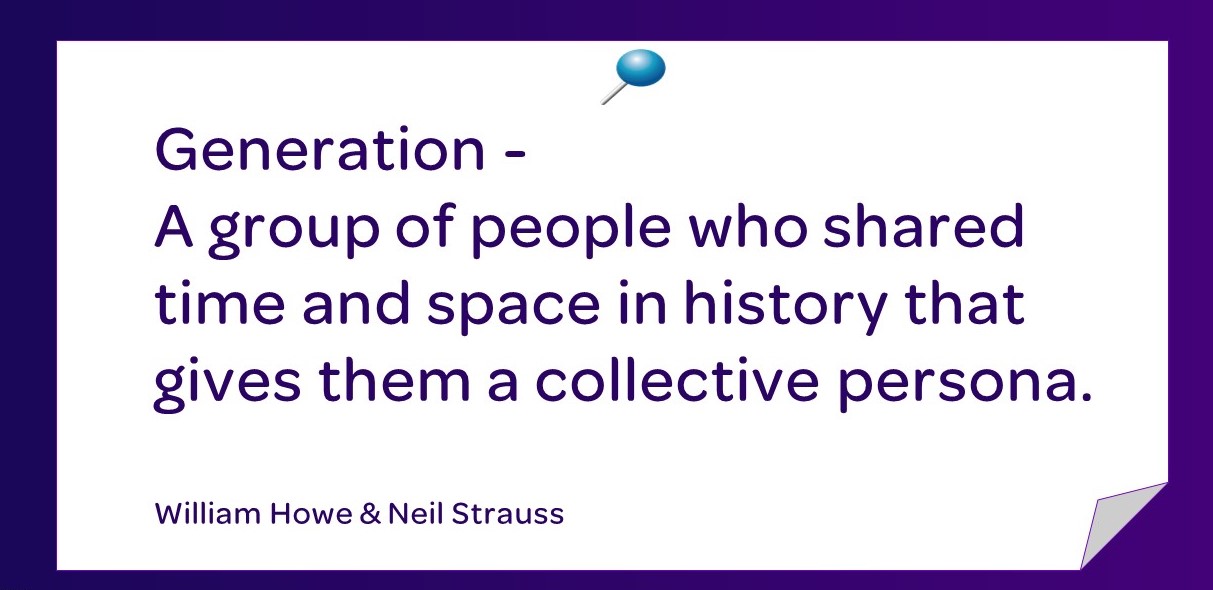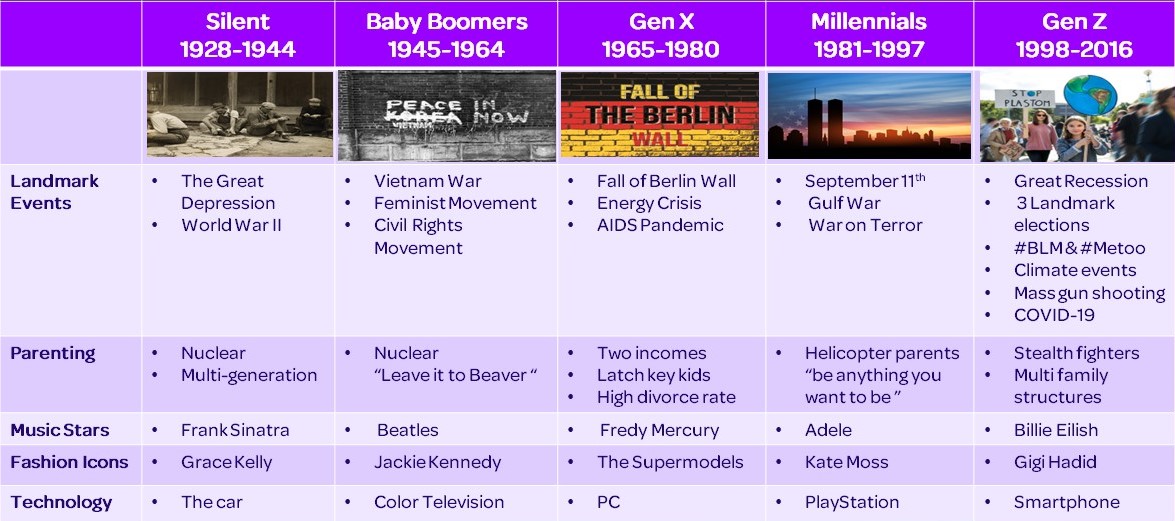“We are living in the age of attention inequality.” That’s what Zach Schwitzky, CEO of…
Everything you wanted to know about Generations
In every interaction we have with clients, conference attendees, or participants in our research, we are being asked about generations: what they are, who defines them, and why it is important to study them. A recent article that pointed to the confusion about the notion of ‘generations‘ and the lack of universal standards in defining them, has prompted us to share with you our answers to some of the key questions we receive. So… Here you go!
How do you define a generation?
Different people define generations differently, some by birth year (Baby Boomers were born between 1945 and 1964…), some by cultural affiliation (the hippies’ generation), and others by major events (Gen Z is the COVID generation). And while all these aspects can be part of what a generation is, the best definition we found in years of generational research comes from historians William Howe and Niel Strauss. In their book, Generations, they defined a generation as: a group of people who shared time and space in history that gives them a collective persona. This “collective persona” is the identity each generation has.

What exactly is a generational identity?
In generational research, we work on the premise that people who grew up at the same place at the same time have shared experiences that made them similar in values, beliefs, and behaviors: these are the core elements of generational identity. These experiences happen during the formative years, when people are young and impressionable and thus most influenced by big events. It is very important to emphasis the point that people in the same generation are similar but not identical because of the tendency to make gross generalizations when we spaek about generationss for example, “Millennials are entitled” or “Baby Boomers are workaholics”. In reality, we know that this cannot be true because it is simply not possible. No generation is entirely homogeneous.
Why research generations then?
We study generations because it helps us identify common themes across cohorts of people who were born at the same place and at the same time. In turn, this allows us to imagine future scenarios and prepare for them. For example, knowing what the core values of Gen Z are, we can imagine how these values could affect their expectations from brands and ask ourselves if our products, services, communications, and go to market strategies are geared towards addressing these values and if not, what do we need to do to adjust. Another example: by understanding different generations we can imagine the challenges and opportunities that emerge when members of all generations are working together under one roof. We then can take the necessary actions (like reorganization of work teams or awareness training) to maximize the benefits of a multi-generational workforce. As such, understanding generations is an extremely valuable tool to better engage, manage, and drive organizational performance and commercial success.
So, who decides when a generation starts and ends?
Defining the exact years that form the boundaries of a generation is not an exact science, yet it is complex because it entails multiple factors. To fully define and understand a generation, one has to take into account the full cultural, political, economic, and social context that made a lasting impact on that group during their formative years and shaped their values, beliefs, and behaviors for life. These effects are the result of events that uniquely impact one generation versus another and typically signify a beginning or an end of an era like wars, economic cycles, wild card events like pandemics or terror attacks and so on. For example, the attitude toward money of members of the Silent Generation was defined by their childhood expereince during the Great Depression. Using major events as markers became the basis of deciding the beginning and end of each generation and while researchers can argue their case for one cut-off point or another there is (almost) a consensus today as to those dates:
The Silent Generation: 1928- 1944
Baby Boomers: 1945-1964
Gen X: 1965-1980
Millennials: 1981-1997
Gen Z: 1998-2016
Gen Alpha – 2017- TBD
What factors do you consider when studying generations?
The list is long but we typically look into the following:
Culture – What are the norms and behaviors that were accepted and celebrated by a society during the formative years of a cohort? What are the cultural outputs of an era? Who were the greatest music artists, the best actors / actresses, the best movies, the fashion icons.? All these aspects tell us a lot about what a generation stands for; what they cared about, and how they wanted to be seen.
Social– What were the social issues that mattered most for a generation. The rise of social movements; the feminist movement and the civil rights movements were critical in defining the Baby Boomers as much as the #Metoo and the Black Lives Matter movements shaped the views of Gen Z. In addition, we examine social structures, especially the family and parenting styles, both have a huge effect on who we are. In the United States, family structures have evolved throughout the years: from the prevalent nuclear family that most Baby Boomers are familiar with to today’s multi family structures that include nuclear, blended, multi-generational, same sex, and single parent households.
Economy – economic booms and busts always had a huge influence on attitudes, beliefs and behaviors of a generation. Gen Z is growing up to be financially conservative largely because of their experiences of the Great Recession of 2008 and the economic effects of COVID-19.
Political – The political context is also a significant factor especially if it includes extreme events like wars or wild card events like terrorist attacks. Think Vietnam war for Baby Boomers, or September 11th for the Millennials. These events are not only memorable but also play a major role in how a generation views the government and its actions, and perhaps most important is how their level of trust in government evolved as a result. Trust is another dimension we carefully consider in generational research.
Technology – Constantly evolving, technology always puts its mark on a generation. It influences every aspect of our lives including communication, mobility, learning, and so on… each generation has a few major technologies that shape their behaviors and lifestyle.
The table below illustrates some of the concepts you just read.

Source: Gen Z Planet Research
Why there is a growing interest in Gen Z ?
With 78 million Gen Zers in the U.S. and 2.5 billion globally, the next generation is emerging as a social, cultural, economic, and political power that no one can afford to ignore. Gen Zers are deeply engaged in the world around them; setting new trends, creating movements, and driving the conversations on topics that varies from workplace to politics. In addition, business leaders (and the media) pay more attention to Generation Z because we all want to avoid the “Millennials mistakes”. Many organizations struggled with the rise of Millennials who did not fit the mold of what was thought to be a “good employee”, nor did they follow the life stage patterns that informed marketing for years. It was confusing. Companies were not well prepared for that change, and as a result, resources got wasted, frustration was high, and many opportunities were lost along the way. Therefore, it is crucial that we pay attention to Gen Z and get it right this time.
What makes Gen Z unique?
It is important to note that to fully understand Gen Z we have to study ALL generations, because only by comparing and contrasting data across generations we can truly identify where Gen Z is different. So based on our research here are the top three attributes that make Gen Z unique and have a huge effect on what they expect from brands, employers, and society in general.
1.Diversity – Gen Z is the most diverse generation to ever live in the United States with 48% of the generation being members of minority groups.
2.Education – Gen Z is the most educated generation with the lowest high school dropout rate and the highest college enrollment rate to date.
3. Connectivity – Gen Zers are the true “digital natives”, they don’t know a world without digital devices, search engines, or social media – something that has profound effect on who they are, their beliefs and behaviors, and their growing level of engagement with and influence on the world
But this is not all! Gen Z has many other important attributes both as emploees and as consumers. To learn more about this fascinating generation order today a copy of Gen Z 360: Preparing for the Inevitable Change in Culture, Work, and Commerce





